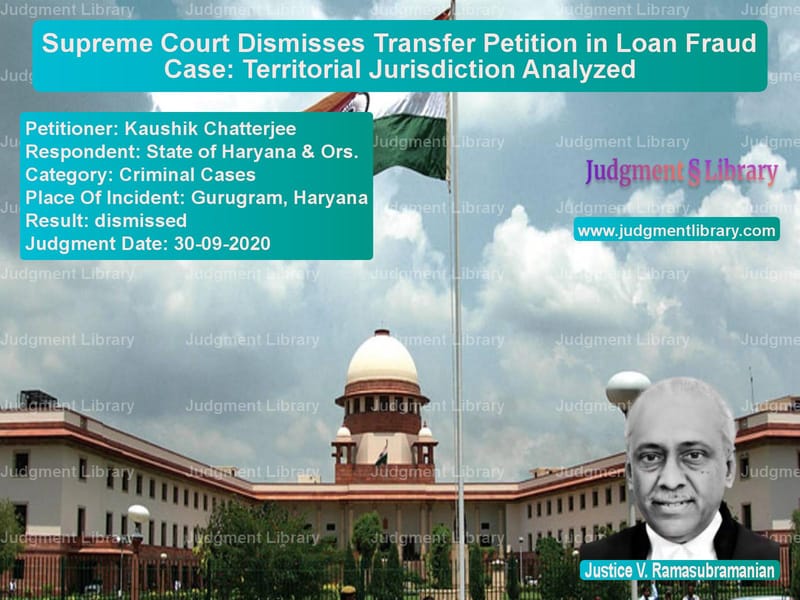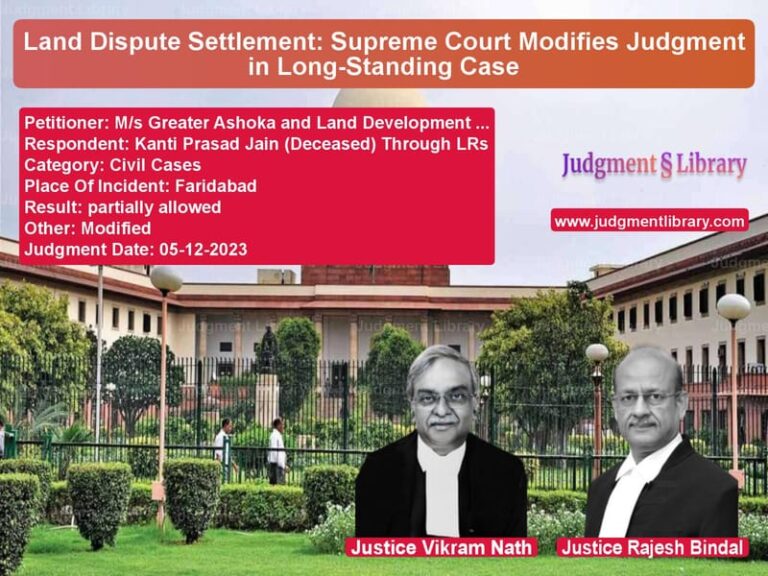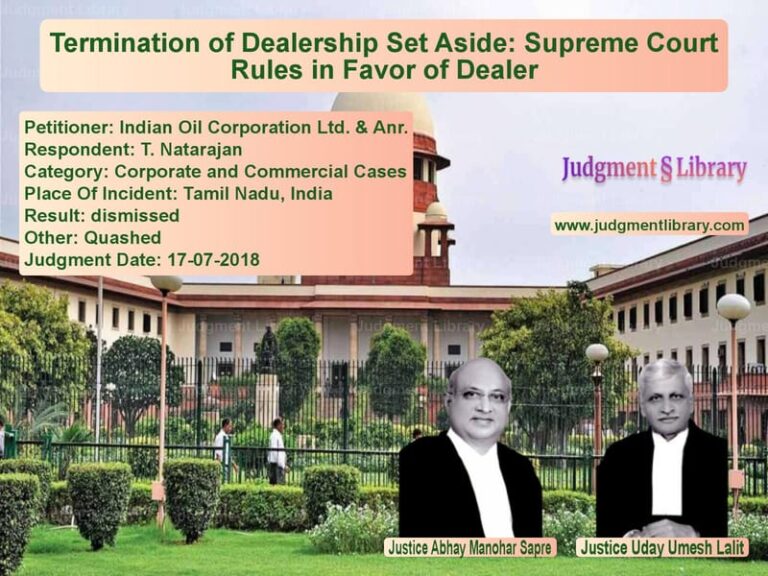Supreme Court Dismisses Transfer Petition in Loan Fraud Case: Territorial Jurisdiction Analyzed
The case of Kaushik Chatterjee vs. State of Haryana & Ors. deals with the issue of territorial jurisdiction in criminal trials. The Supreme Court had to decide whether criminal cases involving loan fraud should be transferred from the Additional Judicial Magistrate’s Court in Gurugram, Haryana, to a competent court in New Delhi.
The petitioner, Kaushik Chatterjee, was an executive at a non-banking financial company (NBFC) and was implicated in three criminal cases related to loans sanctioned during his tenure. He sought the transfer of these cases, arguing that no part of the cause of action arose in Gurugram, making the filing of the complaints there improper. The Supreme Court, however, dismissed the transfer petitions, holding that the question of territorial jurisdiction should be determined by the trial court based on evidence.
Background of the Case
The petitioner was appointed as the Group Chief Risk Officer-Executive Director of the complainant company, a non-banking financial institution, on August 4, 2016. He worked at the company’s Delhi office before being transferred to Mumbai in April 2017. He resigned from his position in July 2018.
The criminal cases against him arose from three different loans sanctioned during his tenure. The details of the cases are as follows:
| FIR No. | Offences Alleged | Borrower | Date of Sanction | Loan Amount |
|---|---|---|---|---|
| 452/2018 | IPC Sections 406, 408, 420, 120-B, 34 | Zillion Infraprojects Pvt. Ltd. | 26.10.2016 | Rs. 4.3 Crores |
| 748/2017 | IPC Sections 114, 120-B, 406, 420, 467, 468, 471, 216 | Al-Fatah Tours and Travels | 22.09.2019 | Rs. 71.5 Lakhs |
| 356/2019 | IPC Sections 120-B, 406, 408, 420, 387, 34 | Hotel M.S. | 30.12.2016 | Rs. 46 Lakhs |
After completing the investigation, the police filed charge sheets in all three cases. The petitioner, in response, filed transfer petitions seeking to shift the cases to New Delhi.
Petitioner’s Arguments
The petitioner, represented by Senior Advocate Vikas Singh, argued:
- No part of the cause of action arose in Gurugram, as the loans were sanctioned in Delhi, Indore, and Surat.
- The complainant company did not even have an office in Gurugram.
- The filing of the complaints in Gurugram was done to harass him, as the complainant had influence in that region.
- The cases should be transferred to New Delhi to ensure a fair trial.
Respondent’s Arguments
The complainant company and the State of Haryana contended:
- The issue of territorial jurisdiction was a question of fact to be determined during the trial.
- One of the loans was secured against a property located in Gurugram.
- The petitioner’s claim that the complainant had no office in Gurugram was incorrect.
- The loans involved fraudulent transactions, and Gurugram courts had jurisdiction based on legal provisions.
Supreme Court’s Key Observations
The Supreme Court analyzed the issue of territorial jurisdiction in criminal trials and made the following key observations:
“The jurisdiction of a criminal court is determined by the place where the offence was committed or where its consequences ensued. The issue of jurisdiction is a question of fact that must be established by evidence.”
The Court further noted:
- The question of territorial jurisdiction in criminal cases is governed by Sections 177 to 184 of the Code of Criminal Procedure (CrPC).
- The trial court is the proper forum to determine whether the cause of action arose within its jurisdiction.
- If an accused believes a court lacks jurisdiction, the proper course is to raise the issue before the trial court, not seek a transfer at the outset.
Legal Precedents Considered
The Supreme Court referred to several precedents, including:
- Asit Bhattacharjee vs. Hanuman Prasad Ojha (2007) 5 SCC 786: Held that jurisdictional issues should be raised before the trial court based on evidence.
- Raj Kumari Vijh vs. Dev Raj Vijh (1977) AIR 1101: Distinguished between jurisdiction based on offence and territorial jurisdiction.
- State of Uttar Pradesh vs. Sabir Ali (1964 AIR SC 1673): Clarified that jurisdiction in criminal cases must be determined by considering the entire sequence of events.
Final Judgment
The Supreme Court dismissed the transfer petitions, stating:
“The issue of territorial jurisdiction is a factual question that must be decided by the trial court after considering the evidence. Ordering a transfer at this stage is not justified.”
The Court also held that both parties could raise the issue before the trial court and that the trial court must decide the matter based on Sections 177 to 184 of the CrPC.
Implications of the Judgment
This ruling has significant implications for criminal law and jurisdictional challenges:
- It reinforces that territorial jurisdiction in criminal cases must be determined based on evidence, not mere allegations.
- It prevents forum shopping, where litigants file cases in favorable jurisdictions to harass the accused.
- It ensures that trials proceed without unnecessary delays caused by jurisdictional challenges.
- It upholds the trial court’s role in determining jurisdiction under the CrPC.
With this ruling, the Supreme Court has provided clarity on how jurisdictional issues should be handled in criminal cases, ensuring a fair trial process for both accused individuals and complainants.
Petitioner Name: Kaushik Chatterjee.Respondent Name: State of Haryana & Ors..Judgment By: Justice V. Ramasubramanian.Place Of Incident: Gurugram, Haryana.Judgment Date: 30-09-2020.
Don’t miss out on the full details! Download the complete judgment in PDF format below and gain valuable insights instantly!
Download Judgment: Kaushik Chatterjee vs State of Haryana & O Supreme Court of India Judgment Dated 30-09-2020.pdf
Direct Downlaod Judgment: Direct downlaod this Judgment
See all petitions in Fraud and Forgery
See all petitions in Extortion and Blackmail
See all petitions in Theft and Robbery Cases
See all petitions in Judgment by V. Ramasubramanian
See all petitions in dismissed
See all petitions in supreme court of India judgments September 2020
See all petitions in 2020 judgments
See all posts in Criminal Cases Category
See all allowed petitions in Criminal Cases Category
See all Dismissed petitions in Criminal Cases Category
See all partially allowed petitions in Criminal Cases Category







